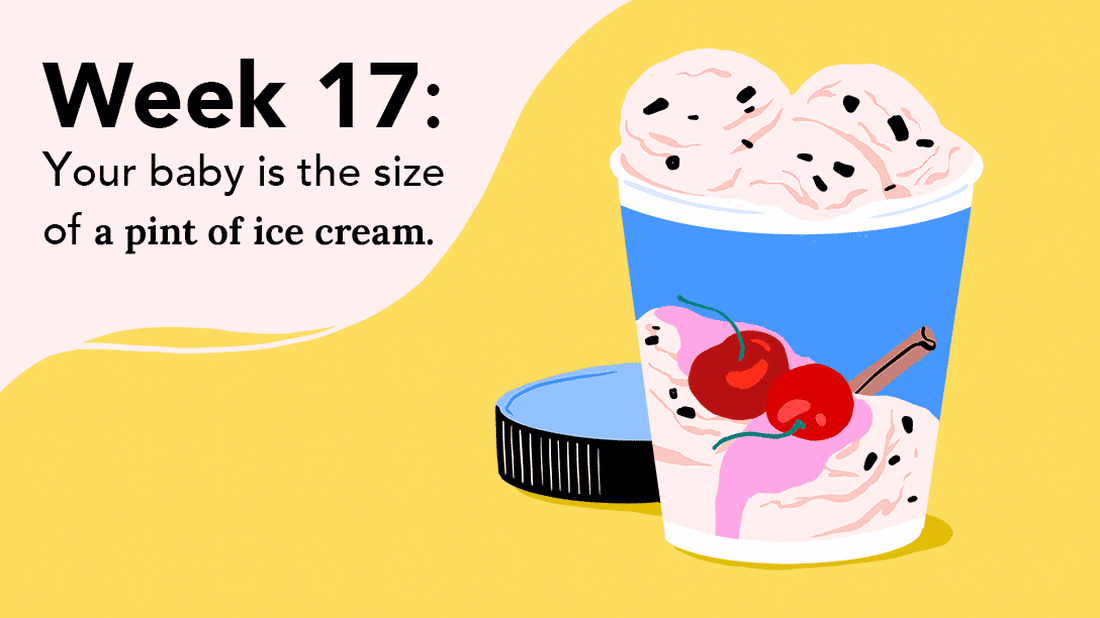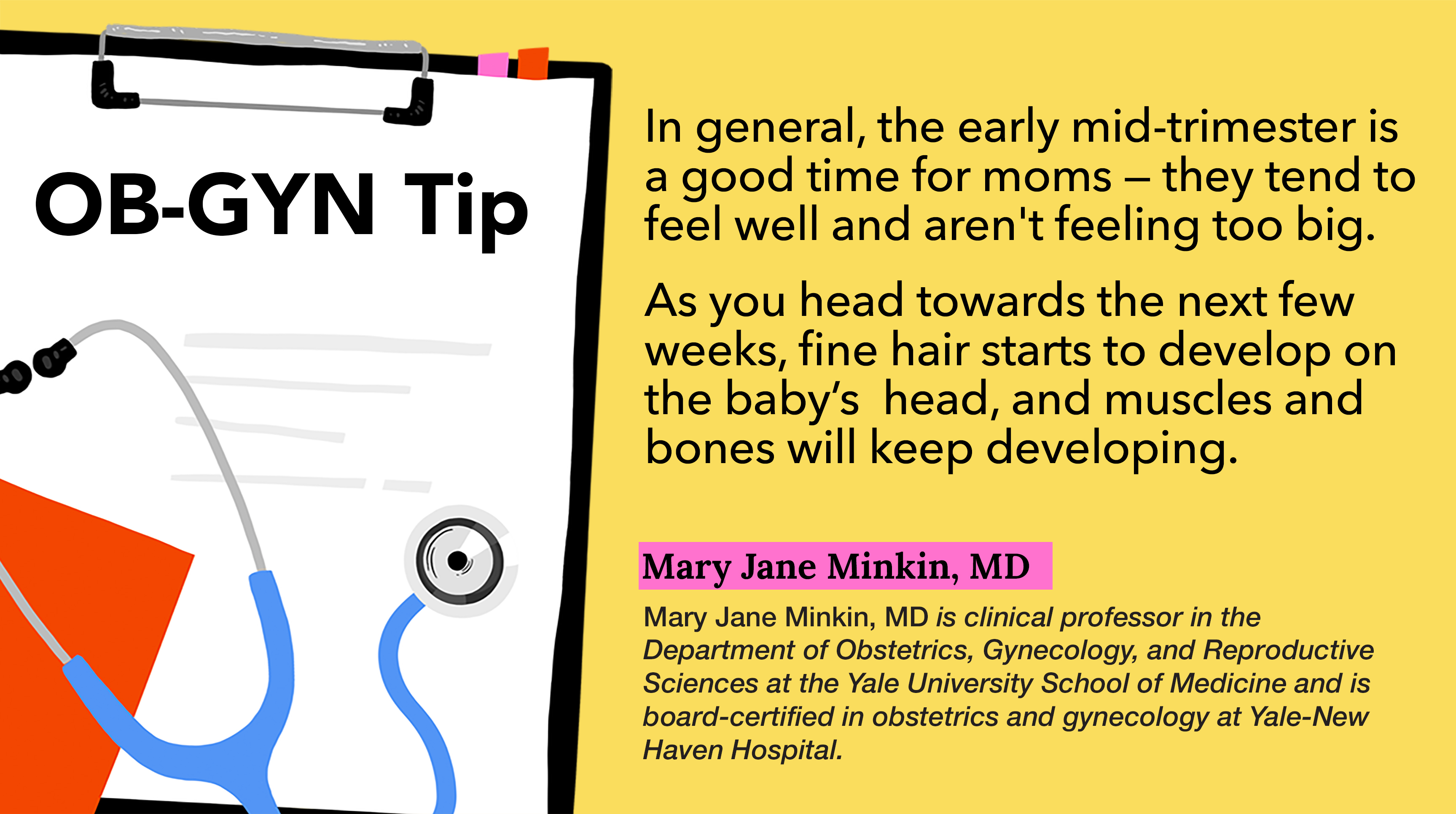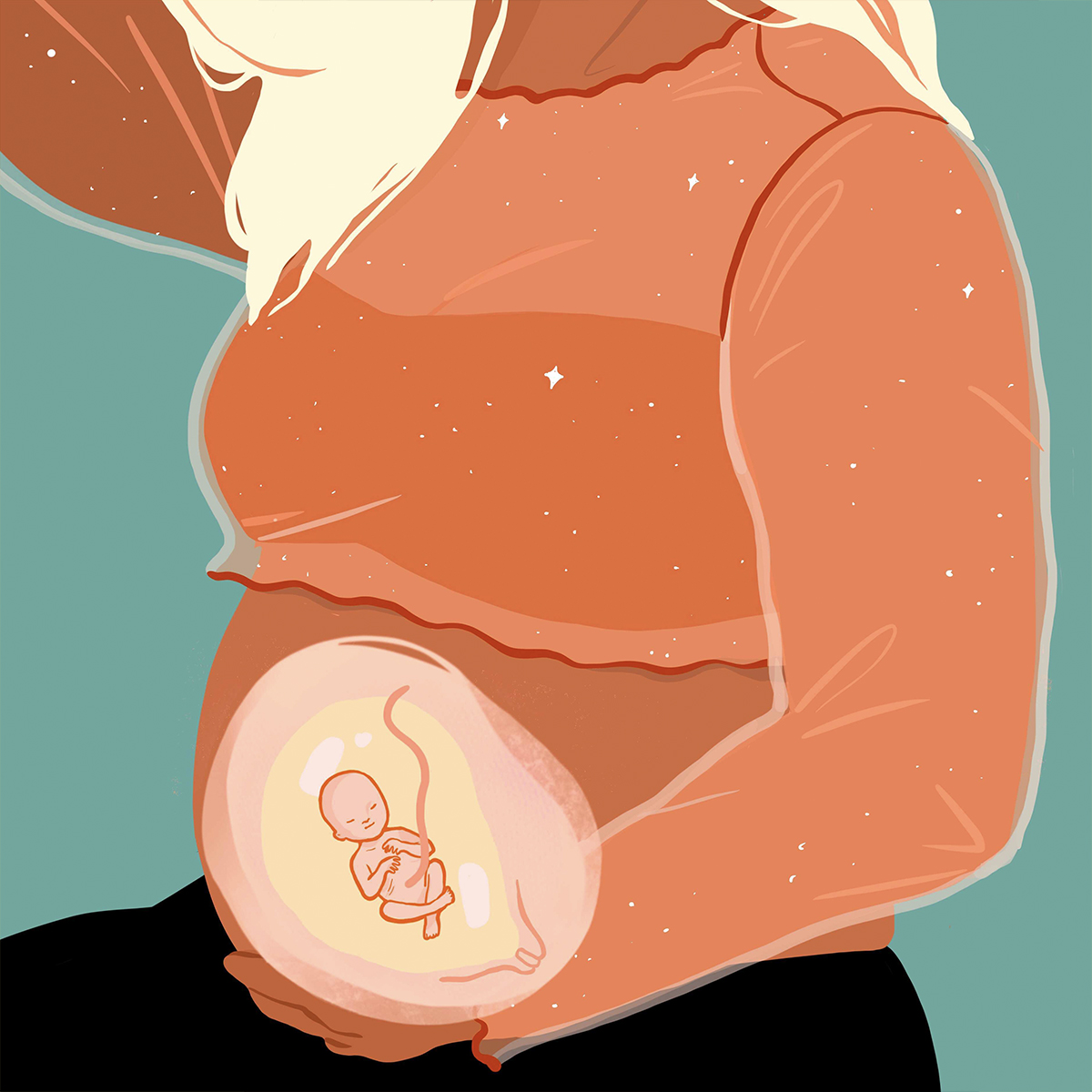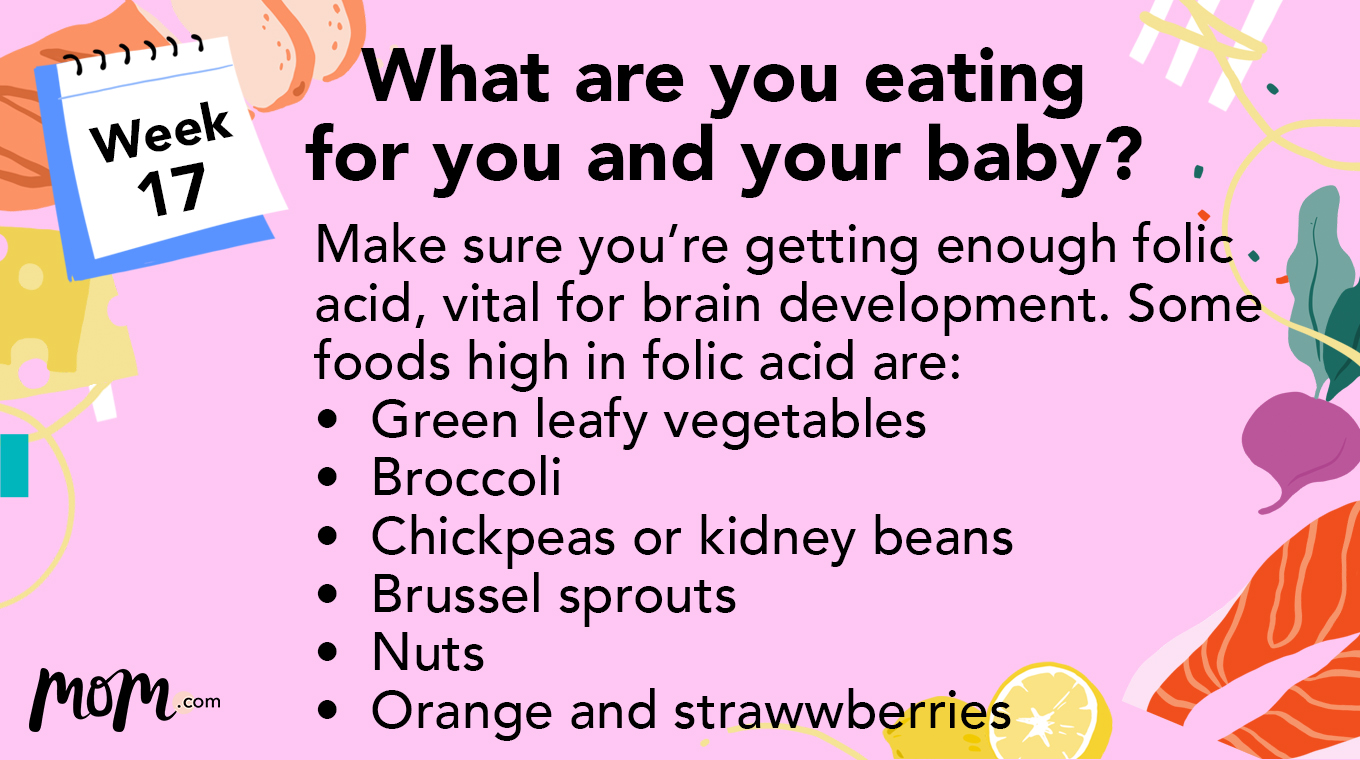
In this article
You’re 17 weeks pregnant!
By week 17, your baby has fully developed fingers with their unique fingerprints in place. During the first part of the second trimester, your baby’s fingers and toes are separating from each other to look like yours do. Likewise, your baby is already growing fingernails and toenails.
You’ll likely have also started feeling the quickening — which is just fancy pregnancy speak for feeling your baby kick you from the inside. It has been likened to a light fluttering in your belly — but don’t worry if you haven’t felt any kicks yet. Every baby and pregnant person is different — and the kicks are usually felt starting around weeks 16 to 22.

Pregnancy symptoms at 17 weeks
At 17 weeks pregnant, your belly will start to get more noticeable and that increased weight and space you occupy will most likely make you feel off balance as your center of gravity starts changing. Avoid circumstances that increase your risk of falling and you may want to consider wearing flat or low-heeled shoes to prevent falls.
Here are some additional signs of pregnancy at 17 weeks:
Dry eyes and vision changes
Thanks to all those hormones coursing through your body, you may start experiencing drier eyes or vision changes. These hormone changes can cause dry eyes — and the increased water retention can change the curvature and thickness of your cornea, thus changing your vision. Try using over-the-counter eye drops or switching to wearing glasses if you normally wear contacts. Your eye doctor will likely refrain from writing new prescriptions since after the pregnancy, your vision will often return to normal.
Growing breasts and breast tenderness
Just like everything in your body, your breasts are also swelling and getting bigger! Not only will there be increased blood flow to your breast tissue, your breasts are building up fat, tissue, and milk glands to prepare for breastfeeding.
Increased body fluids
Not only is your body increasing, so is all the effluvia that is emitting from your body! Due to the greater blood flow needed for your body — you are growing a person after all — vaginal discharge, mucus, sweat, and other bodily fluids will increase in volume. Remember, vaginal discharge is your body’s way of protecting your birth canal and baby from infection so avoid douches or feminine wipes which can irritate your genital tract and lead to infection. Don’t worry; it’s all normal (if a bit moist).
Itchy skin and stretch marks
Your skin is stretching to accommodate your growing body — which is getting larger to accommodate your growing baby. As a result, your skin is thinner and a lot more sensitive — especially in areas of major growth like your breasts and belly. You may also find these same areas — along with perhaps your thighs — sporting stretch marks, which occur when the skin grows too quickly and becomes overstretched. Resist scratching and consider upgrading from a lotion to a cream to soothe your itchy skin.
Constipation
Pregnancy hormones can slow down your gastrointestinal tract so when combined with your expanding uterus putting pressure on your bowels, you can get very constipated. Drink more water, eat more fiber, and try probiotics (as long as your doctor approves).
What does 17 weeks equal in months?
At 17 weeks pregnant, you’re in the last week of your fourth month of pregnancy and second trimester. Here’s what pregnancy weeks equal to in months for the second trimester:
- Month 4: Weeks 14 to 17
- Month 5: Weeks 18 to 22
- Month 6: Weeks 23 to 27
Your ultrasound
At 17 weeks pregnant, there likely won’t be an ultrasound if your doctor follows the American College of Obstetricians and Gynecologists (ACOG) recommendation of getting at least one ultrasound around 18 to 22 weeks. If you need an amniocentesis, those are usually scheduled around 15 to 20 weeks. During an amniocentesis, the OB/GYN will also conduct an ultrasound to check on your baby’s health and development. This allows them to gather data on your fetus’s gestational age, check for certain genetic disorders, and listen to the fetal heartbeat.
Your pregnant belly at 17 weeks

At 17 weeks, your baby is typically a little longer than 5 inches — around the length of a mascara tube — and weighs about 5 ounces. Your appetite has likely increased to keep up with demand from your growing body and the growing baby. As a result, you are likely more visibly pregnant.
Keep in mind that once you start showing, some people — including complete strangers — may think they’re entitled to access your body, as if your belly existed for them to touch or rub. Remember that it’s your body — you are not public domain. Whether they are family, friends, or a stranger, you have the right to refuse and be upset if someone touches you without your permission.
It may also be time to no longer sleep on your stomach if you’re a stomach sleeper. In addition, if you’re a back sleeper, your growing baby and uterus can put pressure on your inferior vena cava — a big vein that brings blood flow to your baby — so you may also want to consider sleeping on your left side to optimize blood flow. If you must sleep on your back, consider tucking a pillow under a hip to tilt your body to the side.
Your baby’s skeleton is in the middle of changing into bone from soft cartilage, sweat glands are starting to form, and body fat is beginning to accumulate on the fetus, too. The umbilical cord is gaining thickness and strength, and your baby’s brain is now regulating their heart at about 140 to 150 beats per minute. They’re also practicing sucking and swallowing to prepare for nursing, too.
Pregnancy tips at 17 weeks
At 17 weeks pregnant, you may want to do the following for yourself:
Avoid hot showers
While hot showers can relax your aching back and muscles, cold showers can also relieve your pains as well as boost blood circulation. Plus, even if you prefer hotter temperatures, know that it can increase your odds of dizziness or fainting. Heat dilates your veins and allows blood to pool in your lower limbs, thus limiting blood flow to your brain — and when your brain is deprived of oxygen from your blood, fainting is a very real possibility.
Wear cotton underwear
Remember all that increased vaginal discharge and sweating? It’s gonna get damp and moist down there. Wear breathable cotton or moisture wicking underwear to stay comfortable and prevent developing yeast infections. You can also use unscented pantiliners, too.
Provide enough moisture for your skin
Your belly and breasts are probably itching a lot and not only is that annoying, your constant scratching will only further irritate your skin. Consider using thicker moisturizing cream with vitamin E or cocoa butter to nourish your skin. Some products even lessen stretch marks!
Your pregnancy checklist at 17 weeks
Once the second trimester begins, you will be at the OB/GYN every four weeks so make sure you schedule those visits ahead of time.
Add a baby registry
Your friends, family, and coworkers will likely want to celebrate your new baby — so make sure you give them a way to bless you (and give you exactly what you want or need). Ask some more experienced friends — or consult the internet — for some of the items you’ll need for your new baby. Remember: while cute outfits are definitely social media worthy, you’ll always need diapers. Consider adding multiple sizes so the diapers grow in size along with your little one.
Start a dream diary
Thought to be a means for you to process the upcoming changes to your life and body — as well as act as an outlet for stress, some people have incredibly vivid dreams during pregnancy. If that’s you, consider putting a notebook by your bed and writing down your dreams after you wake up. If anything, it can be a fun keepsake for your child.
What are you eating for you and your baby?

Your appetite at 17 weeks pregnant will likely be increased from your first trimester. Consume approximately 2,200 calories a day to properly feed you and your baby. Since your stomach capacity may be shrinking due to your baby taking up more space, try eating many small meals of nutrient-rich foods like hearty soups, leafy greens, and lean protein.
Folate
Folic acid, a critical B vitamin, is vital for healthy fetal central nervous system and brain development. While it’s best to get folate through your food, you can also take supplements. Some foods high in folic acid are:
- Green leafy vegetables
- Broccoli
- Chickpeas or kidney beans
- Brussel sprouts
- Nuts
- Oranges
- Strawberries
Protein
Protein also contributes to fetal brain development as well as other fetal tissues. You can get protein by eating these foods:
- Nuts
- Tofu
- Eggs
- Lean meats
- Cooked fish
- Lentils, beans, and peas
Calcium
Calcium is needed to develop strong bones for your baby, so eat calcium rich foods found in dairy products, dark leafy greens like spinach and kale, almonds, and lentils. Try to eat them with foods high in Vitamin D like salmon, egg yolks, and herring or sardines to help your body better absorb the calcium.
In addition, try to avoid or restrict the following foods:
- Caffeine, alcohol, and drugs
- Undercooked meats
- Unheated lunch meats
- Unpasteurized foods (e.g.: soft cheeses)
- Unwashed fruits and vegetables
- High mercury seafoods
- Raw eggs
When to call your doctor
Contact your medical practitioner immediately if you are bleeding, spotting, and experiencing pelvic or abdominal cramping. You may also require additional mental and emotional support because your hormones also affect your emotional state. If you currently or have previously suffered from depression, excessive stress, or anxiety, reach out to a professional for help if it gets too much.
According to the Centers for Disease Control and Prevention (CDC), pregnant women are at a higher risk of severe illness from COVID-19 and death compared to non-pregnant people. Furthermore, pregnant women with COVID-19 are at increased risk of delivering a baby before 37 weeks (preterm birth) and other adverse ramifications.
Note: If you are visiting a mental health professional or medical professional during COVID, make sure to ask about the facility’s safety measures and confirm that they are following COVID protocols as indicated by the CDC.
Additional considerations
According to studies, anemia is 3 times more common in Black women than white women and Black women are 2 times more likely to be diagnosed with anemia in pregnancy. Anemia is the health condition where your body doesn’t have enough healthy red blood cells to carry oxygen to your body tissues — and when you’re pregnant, to your growing baby.
When pregnant, anemia increases your chances of premature birth, having a low birth weight baby, postpartum depression, a higher risk of infant mortality before or after death. If you have a history of anemia — or feel constantly fatigued, weak, short of breath, have pale or yellowish skin, chest pain, dizziness, or cold hands and feet, please speak to your doctor.
Since the most common cause of anemia is iron deficiency, you may want to consider taking a slow-release iron supplement as well as eating more iron rich foods such as:
- Red meat
- Leafy green vegetables like kale or spinach
- Whole grain breads
- Dried fruits and beans






